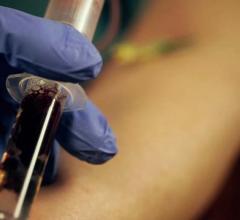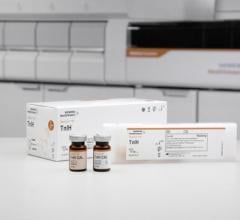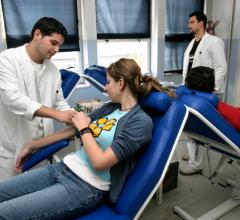
February 20, 2012 — BG Medicine Inc. announced positive results from its pivotal validation study for the CardioSCORE diagnostic test, previously known by the development name AMIPredict. CardioSCORE is a diagnostic blood test designed to improve the identification of individuals at high risk for near-term major cardiovascular events, such as heart attack and stroke, over conventional risk factor scoring, in otherwise asymptomatic adults. In December 2011, BG Medicine filed a 510(k) premarket notification with the U.S. Food and Drug Administration (FDA) for regulatory clearance of CardioSCORE, following the successful completion of the pivotal clinical validation study. The validation study, termed the BioImage Study, comprised a community-based cohort of 6,600 individuals recruited from Illinois and Florida.
The results of the BioImage Study demonstrated that CardioSCORE testing at baseline significantly predicted high risk of major cardiovascular events in both men and women during the study's median 2.5-year follow up period, independent of other conventional risk factors for cardiovascular disease, such as cholesterol, blood pressure, smoking status, obesity, diabetes and age. In the BioImage Study, of all subjects who experienced a major cardiovascular event within one year, only 28 percent were identified as high risk at baseline using the Framingham Risk Score, a commonly-used cardiovascular risk assessment algorithm. Consistent with the primary hypothesis of the validation study, the addition of CardioSCORE testing results to Framingham Risk Score assessment instead identified as high risk 60 percent of all subjects who experienced a major cardiovascular event within one year (P<0.0001 for increase). Similarly, of all individuals in the BioImage Study who experienced a major cardiovascular event within two years, CardioSCORE testing increased the percentage who would have been identified as high risk at baseline from 26 percent with Framingham risk assessment alone to 54 percent with the addition of CardioSCORE (P<0.0001).
"As leading causes of mortality and morbidity, heart attack and stroke represent significant unmet medical needs in the United States and around the world," said Eric Bouvier, president and CEO of BG Medicine. "CardioSCORE is an easy-to-use blood test designed to identify adults at near-term risk of heart attack or stroke before their first cardiovascular event. We are extremely encouraged by the positive results of this large, U.S.-based study of 6,600 subjects, in which CardioSCORE combined with traditional risk factor assessment more than doubled the sensitivity for detecting near-term risk."
"The fact that approximately 70 percent of patients who suffer from a heart attack or stroke are not properly categorized as high risk using conventional risk factor assessments demonstrates the critical need to more accurately identify patients at risk for these major events," said professor Aram Chobanian, M.D., president emeritus of Boston University and dean emeritus of Boston University School of Medicine. "A diagnostic blood test capable of identifying high risk patients who would otherwise not be identified using traditional risk scales, particularly in the near-term, could potentially enable optimized preventative treatment and save many lives."
"In designing the unique and ambitious BioImage Study, we set out to find a more reliable means of identifying people before their first major cardiovascular event, in order to create a window for effective intervention," said Pieter Muntendam, M.D., executive vice president and chief medical officer at BG Medicine. "The BioImage Study is a large, ongoing study designed to reflect risk profiles as they exist in the population at large. It was implemented through the HRP (high risk plaque) Initiative, a $30 million industry consortium, and Humana, a leading health benefit provider in the United States. BG Medicine was the first to partner with a health benefit provider to establish a cohort such as the BioImage Study, and is proud to be working with Humana and our academic and industry partners towards the important goal of preventing heart attack and stroke."
The BioImage Study was designed to evaluate the ability of biological markers to improve the accuracy of baseline risk assessment for myocardial infarction, stroke, and other major cardiovascular events, over currently used risk assessment methodologies. The BioImage Study is a large, observational cohort comprising more than 7,000 adults with no prior history of cardiovascular disease, enrolled from the Chicago, Ill. and Miami, Fla. metropolitan areas. Among 6,600 participants designated to provide baseline blood specimens, and during a median follow-up period of 2.5 years to date, 292 individuals in the cohort have experienced a qualifying major cardiovascular event or death.
For more information: www.bg-medicine.com


 October 09, 2019
October 09, 2019 









